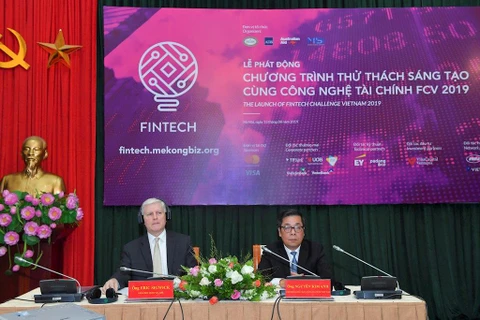 A seminar on Fintech management policy is jointly held by the Vietnam Association of Financial Investors and ITCnews (Photo: VietnamPlus).
A seminar on Fintech management policy is jointly held by the Vietnam Association of Financial Investors and ITCnews (Photo: VietnamPlus).
Hanoi (VNA) – Financial experts analysised and made recommendations on policy orientations for developing and managing Fintech – a new and potential field in Vietnam, at a seminar held in Hanoi on August 20.
Experts said with the development of science and technology, especially mobile technology, in recent years, the financial technology field (Fintech) has made a stride, changing the face of financial-banking system and facilitating business-consumption transactions.
However, Fintech management policies have yet to match the rapid development of technology, leading to many shortcomings that need to be addressed.
Fintech makes financial transactions convenient with a large number of users, so it raises many concerns that Fintech may be exploited for illegal activities.
In recent times, management agencies have taken actions to tighten Fintech management. Notably, some drafts laws restrict foreign investment in term of intermediary payment, or limit the value of transactions and e-wallet account numbers, as well as require re-declaration, causing troubles for users.
At the seminar, experts analysed and shared experiences and made many recommendations on policy orientation for the Fintech sector, towards creating a healthy business environment, improving security and safety for financial transactions, and protecting rights of users.
They stressed that the sector significantly contributes to the development of digital economy and the Government’s policy on non-cash payment universality.
 Phung Anh Tuan, Secretary General of the Vietnam Association of Financial Investors (VAFI) (Photo: VietnamPlus).
Phung Anh Tuan, Secretary General of the Vietnam Association of Financial Investors (VAFI) (Photo: VietnamPlus).
According to Phung Anh Tuan, Secretary General of the Vietnam Association of Financial Investors (VAFI), Fintech is in urgent need of investments so the restriction of foreign investment will hinder the sector’s development.
The digital economy and the Fourth Industrial Revolution is a clear trend that can be seen through the media, Tuan said, adding that it is very necessary to encourage investment and business in developing information technology, including Fintech as well as other sectors.
Regarding regulations on foreign investment in the Fintech field at 30 percent, 40 percent and less than 50 percent as stated in the draft decree that replaces Decree No. 101 on non-cash payment, Tuan said it will be difficult to call for large capital sources or involvement of professional investors and organisations as the limitation on foreign investment is at this level.
He added that the Fintech sector now needs foreign investment for development, from investment in technology, market to human resources.
Ngo Van Duc, deputy head of the Payment Systems Oversight Division at the State Bank of Vietnam, said in recent years, Fintech activities flourished worldwide, and Vietnam is also in the trend and has great potential for development.
 Ngo Van Duc - deputy head of the Payment Systems Oversight Division at the State Bank of Vietnam (SBV). (Photo: VietnamPLus)
Ngo Van Duc - deputy head of the Payment Systems Oversight Division at the State Bank of Vietnam (SBV). (Photo: VietnamPLus)
Vietnam has also seen strong development in the sector in recent times but it is not commensurate with the potential.
According to unofficial statistics by the SBV, as many as nearly 150 Fintech enterprises are operating in many different fields, mainly in payment, with 30 payment intermediaries licensed by the bank.
Other fields are bank lending, banking solutions provision such as electronic authentication, blockchain application, personal financial service.
Varun Mittal, Vice Chairman of the Singapore Fintech Association, who is also the Global Emerging Markets FinTech Leader at Ernst & Young Singapore, said the proposed restriction of foreign investment in the field particularly caused concerns, as the development of Fintech enterprises now largely depends on foreign investment.
Startup enterprises in the field are in need of investment sources for developing technology, market and human resources, while domestic investment resources have not been met.
Foreign investment also allows Vietnamese businesses to access new technologies, especially big data or artificial intelligence (AI), which have special significance for building Fintech products and solutions.
In recent Fintech events, the Government made strong statements and taken moves to promote this sector.
Deputy Prime Minister Vuong Dinh Hue said mobile payment offers opportunities to hundreds of millions of low-income people to easily access financial services at affordable costs, and benefit directly from achievements of the Fourth industrial revolution.
The seminar is expected to serve as a premise for State management agencies in this field to build appropriate policies in order to promote Fintech development, thus bringing more convenience for users, as well as fostering the development of digital society and digital economy in Vietnam./.





















